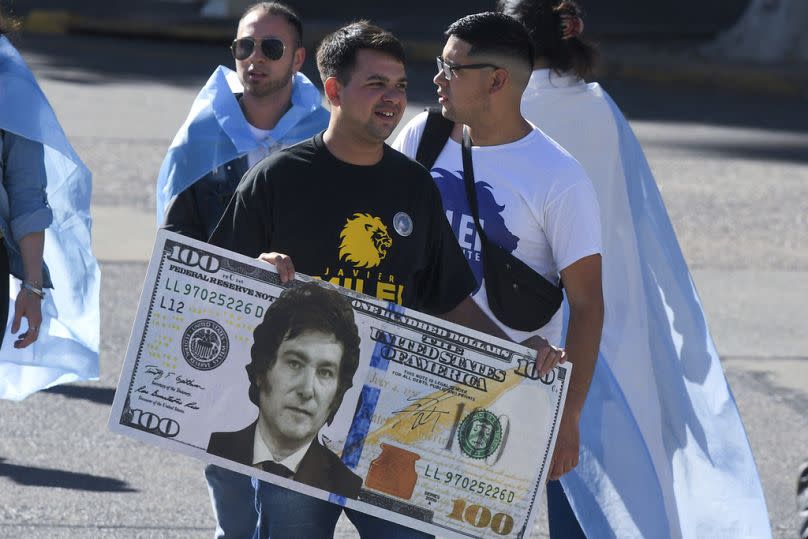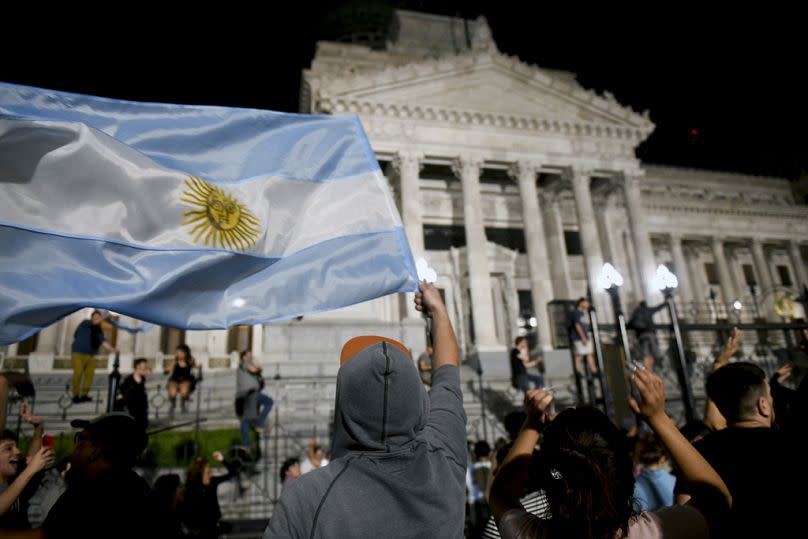Argentina’s far-right liberal President Javier Milei issued a mega-decree in the middle of the week that changed or completely scrapped 366 economic rules, a first in the country.
None of his previous leaders, democratically elected presidents and dictators alike, had attempted to dismantle the system to such an extent.
That is precisely what Milei promised on the campaign trail, brandishing a live chainsaw as a symbol of his attempt to reduce public spending, his answer to Argentina’s three-digit inflation after years of financial mismanagement.
Although Congress still has the power, according to Argentine law, to overturn Milei’s program, many worry that his deregulation decisions could make matters worse in the South American country of 45.8 million.
What will Millei’s decree change?
Ten days after taking office, and on the eve of the festive holidays, Milei presented his decree DNU, or “necessary and urgent decree” to loosen some of the rules related to the country’s economy as Annual inflation hit 160%.
One major change will be the elimination of all rules between the tenant and the landlord, such as laws that limit rent increases.
In recent years, landlords have increasingly priced their properties in US dollars to avoid being stuck with rental income that has long been outpaced by rising inflation. This is a nightmare for renters in a country where access to dollars is tightly controlled. It will now be legal to charge rent in dollars because of the deregulation.

Milei also has loose labor laws, with the trial period for new employees ranging from three to eight months. The compensation laws regarding dismissal without reason have been changed in favor of companies and he plans to renegotiate labor agreements that have been in place since 1975.
He also removed limits to exports and said that the internet market will be liberalized.
Milei has also scrapped rules preventing the privatization of state enterprises and has already set his sights on national airline Aerolineas Argentinas and oil company YPF, naming Elon Musk’s Starlink as the satellite system company intended. of the country, ARSAT, to take.
He also moved to limit the right to strike, which is enshrined in the constitution.
In addition, he moved to get all subsidies for the public transport company, which could immediately see a tenfold increase in ticket prices in one of the most urbanized countries in the world.
There is ‘Stockholm Syndrome’ on protest
Milei, an outsider whose rise to the top office stunned much of the country, blames the interventionism and protectionism of previous governments for stifling the economy.
Before the decree was announced, the new government had already devalued the Argentine peso by more than 50% and announced massive cuts to generous state fuel and transport subsidies from January.
“The goal is to begin the path of rebuilding the country, returning freedom and independence to individuals and beginning to dismantle the enormous amount of regulation that has hindered and hindered economic growth,” said Miles.
Of those who were protesting his measures he said: “People may be suffering from Stockholm syndrome. They are infatuated with a model that impoverishes them.”


The opposition – recently ousted from the government – has blamed Milei for the decree and sees it as a way to avoid his lack of a majority in Congress.
The Libertad Avanza Milei party, which is only two years old, has only 40 of the 257 seats in the lower house, and seven out of 72 in the Senate.
“This is not the way. Send the amendments as bills. Do not be afraid of a democratic debate,” said German Martinez, parliamentary chief for the Peronist coalition Union for the Homeland.
Constitutional lawyer Emiliano Vitaliani told AFP that the highest laws on earth say “in principle, laws cannot be modified by decree and the president cannot replace Congress.”
Political scientist Lara Goyburu said that the decision “jumps beyond all limits, decreeing many issues that require political agreements from Congress and the provinces.”
The decree can be overturned if both houses of Congress reject it, Vitalini said. Otherwise, it comes into force on 29 December.
“The president has made a very big bet, and his success will depend on his ability to get legislative support that is unknown so far,” constitutional lawyer Alejandro Carrio said in a column in Argentina’s La Nacion newspaper.